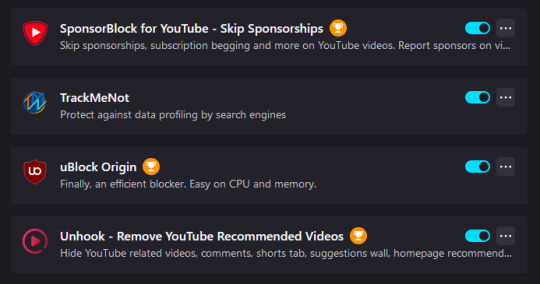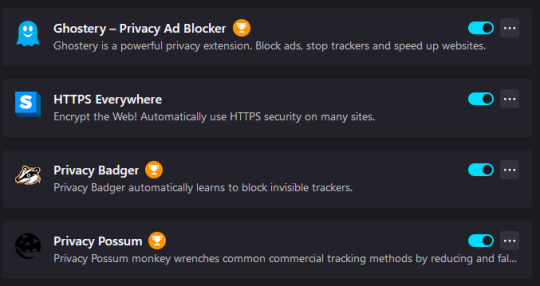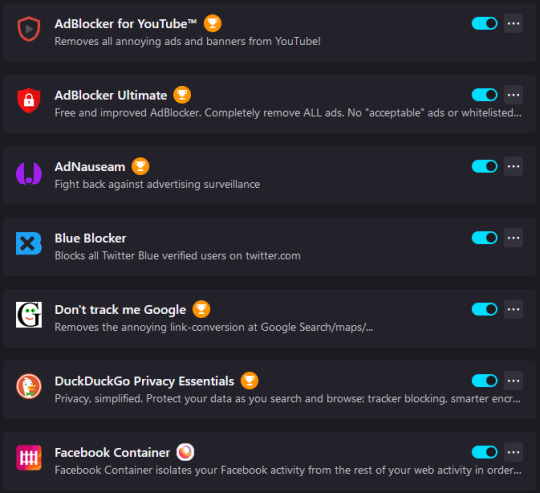#Ad Blocker Google Chrome
Explore tagged Tumblr posts
Text
0 notes
Text
community college is so funny because half of the teachers are like "For this class you need to use lockdown browser for all quizzes and tests. You need to buy this 70 dollar textbook, and all papers turned in must be in APA format with a title page even if they're only 500 words long. I will not accept late assignments. Also you have a minimum of 4 assignments a week." and the other half are like "you don't need proctoring for the final exam I trust you. here's a download link to a pirated copy of the textbook. as long as your writing is coherent and demonstrates an understanding of the material I literally could not care less what format you use. I can't figure out how canvas works so I'm not giving you due dates, just make sure it's turned in before the grading period ends. your only weekly assignment is a forum post with a minimum of 100 words."
#my favorite teacher so far is still the film history professor I had in my first semester.#he was very old and didn't understand how canvas worked at all and sometimes had trouble opening a video file#but simultaneously he was tech literate enough to recommend we use firefox with an ad blocker#because whenever someone missed class and was like 'where do i go to find the movie' he'd be like 'use an ad blocker and google it'#he said the school made him stop emailing links to free movie sites because people would open them on chrome with no ad block#and there'd be borderline malware on them. like this guy gave me the impression he was like. a veteran movie pirate lol.#that class had barely any assignments. like there wasn't a final exam or anything.#he just wanted us to write a paragraph or so answering a few questions about the movies we watched. it was chill.#and i also learned a lot actually. like i didn't know what a nickelodeon was before then. or the Hays Code.#the movies were genuinely good. i never thought Id be that into old black and white movies or westerns for example but they actually slapped#some of them had really mature themes and i definitely started to understand the people on this website who are like#'if the only media you consume is children's media you should maybe branch out instead of calling steven universe problematic'#because a lot of the movies we watched depicted very 'problematic' things and were able to directly address them because they are for adults#(to clarify I didn't just like kids media before then. i just mean that it introduced me to some older stuff i didn't think I'd like)#(but i ended up liking a lot. it also made me realize that movies made today are kind of shit. which i also already knew)#(but it put it more into perspective because I have more to compare it to)#im rambling now. community college is pretty swag i enjoy it. and i do get along with the teachers who have crazy requirements too lol.
9 notes
·
View notes
Text
Google making Chrome less secure so they can keep showing you ads
What's truly behind the change: Ad blockers are so effective it's costing us money, so we're changing Chrome to break the best ad blockers.
What they're doing is akin to a lock manufacturer making lock picking easier after you've installed the lock.
What you should do: install Firefox (and a good ad blocker) and use that whenever possible.
If you are interested in the (somewhat technical) details, they're below. But you don't have to read this: just go to Firefox.com and download Firefox. It will walk you through getting your bookmarks, etc. copied out of Chrome.
#online privacy#online advertising#online ads#google chrome#firefox#privacy#ad blocking#ad blockers#you are the product
2 notes
·
View notes
Note
fluttershy hanging out with Winston Overwatch

SPIN!!
#fluttershy where she shouldnt be#mlp#requests#overwatch#i guess ill tag that#winston overwatch#thank god i have firefox and ad blockers i had to google more funko and overwatch stuff than ever before#if i still had chrome my ads would atrocious
17 notes
·
View notes
Text
explain to me why there were NINE ads on one 40 minute youtube video
#jack facts#my user agent switcher isn't working so no google based video players will work on firefox#regardless if my ad blocker is turned off or if the fucking host even plays ads at all in the first place#so i had to use chrome to watch something and. nine. NINE (9) ads. in 40 min.#die
2 notes
·
View notes
Text
Google is actively blocking Captcha on Firefox
Firefox users have noticed that captchas - both the picture kind and the click the box kind - are not resolving on Firefox. Tests on Chromium based browsers show that it works perfectly fine on them. It is also known that Chrome will be disabling all ad-blockers in June when it moves to Manifest v3, which will greatly limit what extensions can do.
If you use Firefox, there is an extension called User-Agent Switcher and it allows you to change your browser's UA to Chrome. This will allow you to bypass reCaptcha/Captcha blocks set up by Google and make them function properly.
It could be a code snafu on Google's part - but given how predatory they have been acting lately, I'm going to guess not. Don't get locked out of your websites or feel forced to use Chrome again just to browse.
UPDATE: This has been fixed as of 5/4/2024 and no longer affects Firefox. It was a bug in the most recent update of the Captcha code. Hopefully it won't happen again!
39K notes
·
View notes
Text
Okay, Tumblr, I gotta put your powers to the test.
I've been seeing ads over on YouTube for something about a "Pie Ad Blocker" that apparently pays you to NOT watch ads. It's something for Google Chrome.
I don't use Google Chrome. (For many reasons.)
I use Mozilla Firefox.
...My inherent wariness about anything that "sounds too good to be true" is insisting that this thing probably tracks & sells all your data information to ad companies specifically to "pay" for it. But those are just my suspicions.
How much of a scam is Pie? Not / Somewhat / Very? Does anyone know?
Is there anything (honest adblocker, not scam-scummy) like it for Mozilla Firefox users? (Not going to hold my breath, lol, but it's something to look into, I guess. Who couldn't use a few bucks here and there, right?)
Anyway, got any thoughts on this?
0 notes
Text
Any good adblocker as chrome extensions working for real?
0 notes
Text
try the least number of adblockers possible, like some kind of uBlock and *maybe* privacy badger?
Definitely try duckduckgo for your default search because it hides your data. Duckduckgo makes an actual browser for phones and tablets that has a lot of safety features built-in, so it runs faster than a browser with 6 plug-ins that are scanning all the time.
hello google chrome refugees
don't use any of these browsers, they're also chrome

Here are my favorite firefox plugins for security/anti-tracking/anti-ad that I recommend you get



please get off chrome google is currently being investigated for being an Illegal Monopoly so get outta there okay love you bye
145K notes
·
View notes
Text
You Have until June To Dump Chrome
Google has announced that starting in June 2024, ad blockers such as uBlock Origin will be disabled in Chrome 127 and later with the rollout of Manifest V3 (#Mv3).
Firefox is RIGHT there
36K notes
·
View notes
Text
When Google forces me to switch to Firefox because of that whatever June 2024 blocking of ad blockers thing, then I'll switch for good (if it happens).
Otherwise.... I have literally tried to switch to Firefox before in the past but 😐 I can't even do a clean escape because it literally does not have an extension that my friends and I use to watch movies together (so I would literally have to go back and forth with chrome anyway).
Plus, I don't like change. Doesn't matter how "simple" it is.
So once Google actually forces me out then I'll go.
#lol post for no one in particular than myself#firefox had like unique ways to theme up your browser from what i remember#which was superior to chrome of course#but that's all i can remember that was good about it lol otherwise i had no real reason to change over#i literally don't care about privacy issues or ads following my every move or purchase habits#I'm not so paranoid about that because it doesn't really matter to me lol they literally can get my information any other way#Firefox isn't gonna suddenly delete the case file that the ad world has on me - but i know i don't want to see the ads lol#so once the blockers lose their fight with Google then i will switch over 🤷🏿♀️ because other than that it's working fine for me
0 notes
Text
Preventing Google Chrome's Targeted Ads from Accessing Your Browser History
Targeted advertising has become a ubiquitous part of our online experience. When you use a browser like Google Chrome, it collects data from your browsing history to display personalized ads. While this can be convenient at times, it often raises concerns about privacy and the security of your personal information (Google Chrome’s Targeted Ads). In this comprehensive guide, we will explore how to…

View On WordPress
#ad blocker free#ad blockers for android#chrome targeted ads bottom right corner#chrome targeted ads notification#chrome targeted ads popping up#chrome targeted advrts#stop chrome targeted ads in windows 10#Stop Google Chrome&039;s targeted Ads from Browser History
0 notes
Text
Pop Up Blocker Chrome Extension
It is the Pop Up Blocker Chrome Extension. Websites earn money from ads, but these ads are frustrating when any ad pops up whilst surfing on the web. PopGuard Chrome Extension assists you in blocking unwanted ads and popups.
0 notes
Text
Want to keep using Ad Blockers? Stop Using Chrome, Switch to Firefox.
So with the rollout of Manifest V3, Google Chrome is pretty much crippling all ad blockers on Chrome. Effectively, ad blockers can no longer update their lists without fully updating their plugins. It's pretty shitty.
And you may be asking yourself -- what can I do? The answer is simple:
Switch to Firefox. Now.
Now I've been a Firefox evangelist for a long time, I know, but it's a free, open source browser made by a nonprofit org. It's literally the most ethically developed any software could possibly be. It's on every major desktop platform, and it's just... good.
Why would you use a browser made by a corporation that literally removed "Don't be evil" from their mission instead of this? I know that, like, a long ass time ago Chrome was faster, but that's not remotely true anymore. Heck, on Mac Chrome eats way more RAM than Firefox. It's ridiculous.
That's not even mentioning the fact that the amount of Chromium engine browsers out there is kind of ruining the web. Mozilla has their own rendering engine built on open web standards, and diversity in rendering engines helps everyone.
So yeah. If you're using a computer, go get Firefox. They have an Android version too. (They sorta have an iOS app -- but that uses Webkit because of Apple's limitations on third party browser engines -- but it will let you access your sync'd Firefox passwords).
Make your life better.
187 notes
·
View notes
Text
i'm no longer fearful. men are all seemingly rapidly becoming like this. if they can go full radical (extremist term) why can’t we go full radical (root term) too? check this blog for updates over the next coming day/weeks/month. a big change is coming. we are stronger together, by the way. let them be distracted by tearing each other down over race/class/sexuality etc and other minor differences. the old “die heretic!” joke has never been so accurate. let’s focus on our commonality for now. that’s how resistance works, it cannot work in isolation. it needs community and solidarity. i’m considering a book, for free, online, drm free, no profit motive. donate if you want, it’ll go straight to the resistance. i’m making huge lists of recommendations (books, documentaries, etc. anything that isn’t PURELY fiction for the fiction website to read something else for a change). i’m making lists of links of terms and people to look up. if you don’t want to look, fine, it will still be there if/when you do. i’m turning off my privacy blockers and re-enabling search. i’m purging my blocklist, all 11 years of it. i’m making a community, maybe communities. join if you want. there will only be limited moderation to prevent predation and sadistic cruelty. it will be 18+, not for nsfw content, but because <18 need to socialize with their own. if they want to lie and sneak in like i used to, fine, but that’s up to and on them. maybe i’ll blaze them when it’s ready. 11 years with an account on here and 2 more before that and i still can’t pony up any money besides the monthly ad free fee? it’s given so much, why not? it’s under attack too, like the internet archive. why not?
in the meantime, i’ve switched to ecosia (both search engine and browser). go check it out. there’s an invite link at the bottom. it doesn’t do anything other than say how many people have signed up using it. it doesn’t cost or confer anything. all ad revenue supports the trees they plant after every whatever number of searches. your ad blockers don’t fully work anymore anyway. the privacy toggles are equivalent to duckduckgo and much better than chrome.
the link below will take you to the android or ios app or pc. whatever.
Check this out: Ecosia plants trees when you search the web! 🌳
Join me and 20M+ others and start planting today.
https://ecosia.co/app?referrer=friends-93lihr
If you’re using an iPhone or iPad, tap here to confirm you’ve joined:
ecosia://invite/friends-93lihr
/e/os is an os running on the android open source kit. no google, no apple, all functionality.
go get it on a freephone, the completely modular and right-to-repair smartphone made of ethically and sustainably sourced recycled materials.
all of this is the same functionality you already have but free, except for the fairphone obviously. think of the discontinued amazon smile program. speaking of. this third one (raiseright) even lets you buy an amazon giftcard and use between 6-20% of the money for the nonprofit of your choice with 100% same value, if you absolutely must purchase from amazon.
of course, bookshop is always better for books.
don’t see it there? older title? go check thriftbooks.
but first check your library. this extension will automatically check any and all libraries you choose for physical, ebook, and audiobook copies.
there are always alternatives. “no ethical consumption under capitalism” is true, but you still have a choice. you always do. a new world is possible. i hope to see you there. i’m pinning this, btw, because it is 4:30 am and i doubt many people will see this. maybe blaze it later without the top screenshot portion.
59 notes
·
View notes
Text
PSA: Telling Google AI To Go Fuck Itself
So we all know Google is shoving AI down our throats, recently, right? And we didn't ask
On top of the fact that generative AI is SUPER fucking bad for the environment (1) (2) (3)(4)
There's no official way to turn off Google's AI shit, BUT if you use Ublock to block ads (and it's generally recommended by the FBI you should use an ad blocker in this day and age) THERE IS
This reddit post from their subreddit explains the filter you need to use to stop seeing this shit at the very least
go forth and tell google ai to fuck off
P.S. Also, Ublock is capable of blocking youtube ads. You're welcome :)
(also, while you're at it, you should take the time to consider switching browsers. i'm personally a fan of firefox and have been using it for well over a decade at this point as i've never been much of a chrome person)
54 notes
·
View notes